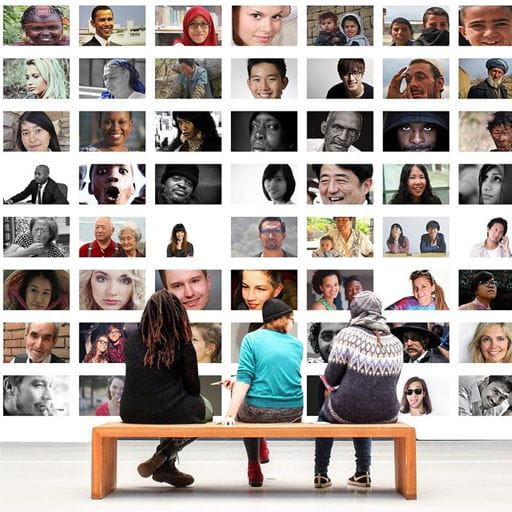Dare to CARE (Creating an Anti-Racist Environment)

Racism; prejudice, discrimination, or antagonism by an individual, community, or institution against a person or people on the basis of their membership of a particular racial or ethnic group, typically one that is a minority or marginalized.
Access to healthcare is a global human right, but racism is also a global issue. On a daily basis health and social care staff and students are at the receiving end of racist abuse from patients, clients and even their colleagues. Similarly, those accessing health care or social care support can be discriminated against due to the racist attitudes of the staff that are supposed to help them.
This project has been created with the purpose of helping health and social care staff tackle racism in their workplaces. Whether you’re a Black or Asian staff member looking for support, or a white colleague who wants to know how to be an ally, we have collated resources to assist in ending racism and racist incidents in health and social care settings.
We have aimed to gather resources that look beyond the UK and the NHS. We want this project to be helpful to all health and social care staff, including those who may be working with marginalised groups in very different settings that are beyond the British Isles. The resources provided here are dynamic and will continue to be developed and added to in the future.
These resources have been specially selected and created to support different health and social care disciplines. Racism doesn’t just affect doctors and nurses in emergency situations. It also involves midwives, dentists, allied health professionals such as occupational therapists or speech and language therapists, professional services and administration staff, and external colleagues such as researchers and social workers.
Through our initiative, “Talk to transform”, we will be utilising the lived experiences of healthcare professionals to bring to life racism in a range of settings. Through these experiences you will understand the impact that racism has on individuals, and how to tackle it when you witness it in person.
Some of the resources created for the Dare to CARE project feature accounts of racism experienced by individuals. These scenarios are anonymised, but have been created using real stories taken from a range of sources.
"The School of Health and Social Care is very proud of the continued work that is going in to the development of Dare to Care, as an accessible suite of resources to raise awareness of and provide opportunities for discussion and exploration around racism and discrimination. Health and social care practitioners and students report unacceptable experiences of racism and discrimination, and we in the School of Health and Social Care stand with our students and partners, providing allyship and advocacy at every opportunity and calling strongly for inclusive practices and an end to all types of discrimination. The resources that make up Dare to Care, funded by Health Education England, East of England, are freely available for you to use, and we will continue to add to them, supporting our students, practitioners, and all service users to work, study, and provide and receive health and social care provision in fair and inclusive settings which promote and enhance health and wellbeing for all."
Equality, diversity & inclusivity (EDI) resources
Too Hot to Handle?
A recent report collaboration between Prof Joy Warmington, brap CEO and Middlesex University Visiting Professor of Education, and Roger Kline, Research Fellow in the University’s Business School shows that the health service is still falling short in tackling race discrimination. The report argues there is a culture of avoidance, defensiveness, and minimisation of racism within NHS trusts. The report brings together key learning from: a number of significant tribunal cases; and survey responses from over 1,300 NHS staff to explore how healthcare organisations respond to allegations of racism.
We would like to thank Jennifer Collier for creating the Moodle resources found on the above pages.
"I want a better understanding of the research and findings around racism in health organisations and ways other organisations have made a positive difference."
Lived Experiences
The three videos that you see here are built from the experiences of student nurses and Black staff who have raised these issues of microaggression and racism. These experiences have been enacted by actors, who we then interviewed after filming to discuss the scenarios they had just worked on.
As you watch the videos consider - how you would feel in these settings? Would you feel like a valued member of a professional healthcare team? Would you feel supported to speak up? Or would you feel dismissed and fear you'll gain a reputation for causing problems?
That's not my name
Names are deeply personal, whether we use the name chosen by our parents or change to a name that has meaning to us as an adult.
Using someone's real name is a sign of basic respect for them as a person. In "That's not my name" a student nurse raises concerns with her placement co-ordinator after choosing a nickname in a moment of pressure, out of fear that she'll be seen as difficult if she chooses to be addressed by her real name.
Your name may have been chosen in honour of a close family member, or because it has a beautiful meaning. How would you feel if your name was considered difficult for others to pronounce? Would you feel comfortable being called something else? Or would you want to be addressed properly?
The New Nurse
For many people their hair is a core aspect of their visual identity. But for generations, white hair has been seen as the norm. Many Black people have experienced discrimination based on their hair, from unwanted touching to comments about certain styles looking unprofessional. You can read more about experiences of hair racism in the paper "Untangling the roots of hair racism in the nursing profession". You can also explore the policies that discriminate against Black and Minority Ethnic communities in this immersive film interactive.
After watching a white colleague touch Amari's hair during a conversation, Naomi explains why this behaviour is inappropriate and the negative feelings it brings out.
As you watch this video, consider how you would feel in Amari's position. Would you really want someone touching your hair? Or would it make you feel like a source of amusement or curiosity?
A new pandemic
COVID-19 isn't the only pandemic the healthcare sector has been challenged by. From microaggressions to explicit racism, staff and trainees often face difficulties in tackling discrimination in healthcare workplaces.
Imagine how you would feel if you were expected to "speak up" every time you were discriminated against, but saw no change? Would you feel inspired to fight harder? Or would you soon burnout and feel compelled to stay quiet?
And as an ally, what would you do to support a colleague you knew was dealing with racism at work?
Unwelcome guests
In this scenario, after receiving conflicting information from the client and her colleagues, the manager takes the side of the client, choosing not to address the racist attitudes exhibited towards her colleagues.
Social Work England highlights the toll racism is taking on social workers in England with 10% of respondents considering leaving their organisation as a result of racism, and 8% considering leaving social work entirely.
As you watch this video, consider how you would feel in Brendon’s and Lucas’ position. Would such treatment from a citizen and you workplace manager make you feel uncomfortable and unsupported?
Change in Landscape
Joyce, a student clinical psychologist, is working with her patient Adam. Matthew, her supervisor, promises to not be involved much unless she needs his assistance.
Joyce starts to feel uncomfortable when, during one of their appointments, Adam accuses foreigners of stealing jobs and blames them for not being able to secure employment himself.
Faced with this setting, Joyce confronts Adam about his views, although they do not come to a resolution. So, Joyce speaks up about her feelings to her supervisor. Matthew, in turn, does not acknowledge Joyce’s feelings, talks over her and defends her patient instead.
Consider how you would feel when faced with prejudice against you and no-one to speak about it to? How would you feel if your supervisor would shut you down if you opened up to them?
Actors reflections
After filming we spoke to the actors about the scenarios, they had just taken part in.
What we found was that, although these were professional actors rather than healthcare staff, several have had similar experiences of racism and microaggressions in the past, for example having strangers touch their hair.
While our project is aimed at staff in the health sector, these interviews show the universal experience of racism. It is not just something affecting a small group of public sector staff, but a problem that many have had to deal with during their daily life.
Acknowledgements
The Dare to CARE project has received a great deal of time and support from people outside of our School.
We would like to thank the following for their contributions: Adjuah Ebo - Producer and Co screenwriter; Mollie Fielder - Director; Ryan Bogle - Sound; Kristin Jaap - Co-Screen writer; Katie Cole - Web content and design.
Talk to transform
We worked with NHS Trust partners to develop sessions that enabled our practice colleagues to have a safe space to discuss their lived experiences of encountering racism.
Talk to Transform uses lived experiences of Black healthcare professionals and learners to show the impact of racism and microaggressions on staff.
Anti-racism and becoming an ally to tackle racism is a whole process of learning. We must learn to tackle our own implicit biases, acknowledge our need to learn and develop even in the face of uncomfortable feelings, and accept that we can always learn more.
We invited Janett Morgan to deliver two workshops on how to create an anti-racist environment. In the video below she talks about the workshops, and you can download the PowerPoint (.ppt) for further information.













